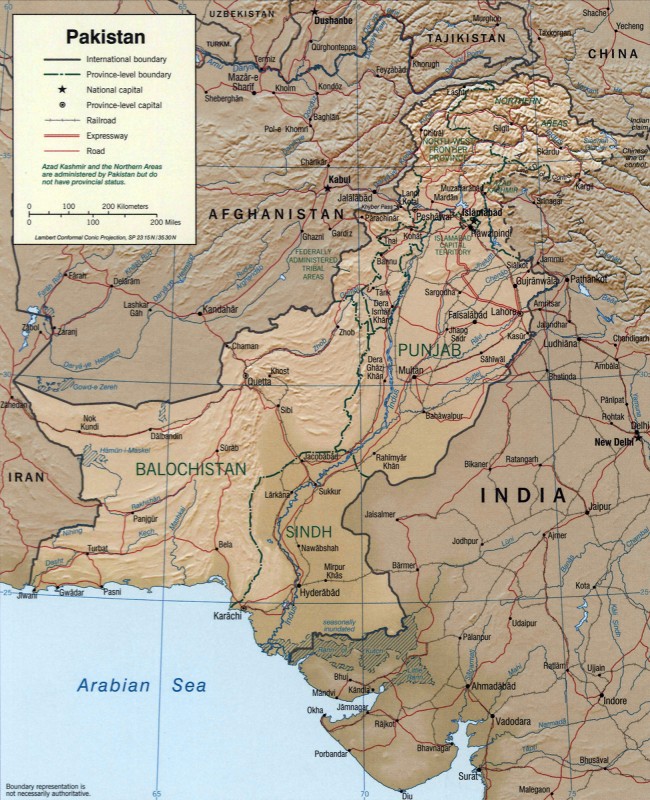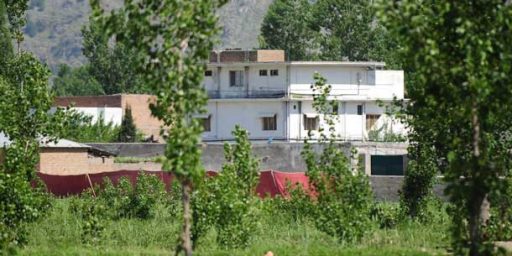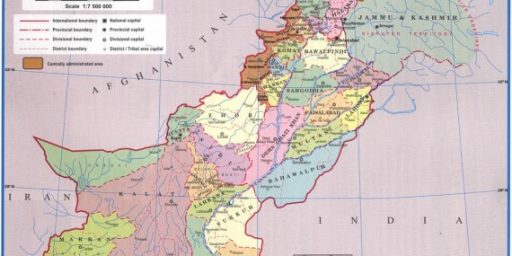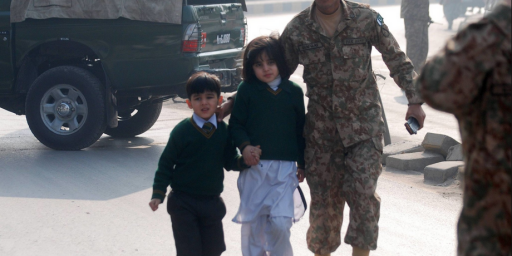Does Pakistan Face an Existential Challenge?
 Fierce fighting continues between the Pakistani military and the militant Islamist Taliban fighters that have taken control of the Swat valley and neighboring areas northwest of Pakistan’s capital in Islamabad:
Fierce fighting continues between the Pakistani military and the militant Islamist Taliban fighters that have taken control of the Swat valley and neighboring areas northwest of Pakistan’s capital in Islamabad:
May 13 (Bloomberg) — Pakistani army chief Ashfaq Parvez Kayani said he has told troops to ensure minimum collateral damage by resorting to “precision strikes” in the operation against Taliban militants in the country’s northwest.
“Consequent to any military operation in populated areas, collateral damage and refugee issues are always a natural outcome,” according to a statement released today in the garrison city of Rawalpindi, citing Kayani.
The United Nations yesterday said it had so far registered more than 500,000 people who have fled the fighting in the Swat valley and neighboring districts since May 2. Of these, about 73,000 are staying in temporary camps, while the others are with relatives or friends, it said.
The military has intensified efforts to wrest control of the Swat valley and neighboring districts from Taliban gunmen as Richard Holbrooke, the U.S. special envoy for Pakistan and Afghanistan, yesterday defended requests to the Senate Foreign Relations Committee for further financial aid to Pakistan.
The military said yesterday it had killed 751 militants since the operation began on April 26 against insurgents who reneged on a peace accord and advanced toward the capital.
However its press releases may read air power remains a blunt instrument rather than a scalpel. I wonder if the inevitable collateral damage that results will cause criticism to be heaped on the Pakistani government either in Pakistan or the western media.
Writing in the Wall Street Journal Bret Stephens considers the “existential challenge” that the Taliban presents for Pakistan:
Today, Somalia is a space not even pretending to be a country. The result is destitution, piracy and a sanctuary for Islamic jihadists, but little by way of ideas for how to change things. Historically Afghanistan has always been a space, defined mostly by its power to repel: The Obama administration would be smart to take this into account by keeping its expectations for nation-building low. Whether post-invasion Iraq is a country or a space remains a question, though it seems to be leaning in the former direction.
As for Pakistan, we’re about to find out.
The world took note last month when a Taliban advance brought it to within 60 miles of Islamabad. But that offensive was less intrinsically distressing than the seeming nonchalance with which Pakistan’s rulers, current and former, surrendered sovereignty to Islamic extremists, first in the tribal hinterlands and then in the Swat Valley.
What kind of state simply accepts that its judicial and political writ doesn’t actually run to its internationally recognized boundaries? Three cases are typical.
One is a weak state that lacks the capacity to enforce its law and ensure domestic tranquility — think of Congo. Another is an ethnic patchwork state that knows well enough not to bend restive or potentially restive minorities to its will — that would be present-day Lebanon. A third is a canny state that seeks to advance strategic aims by feigning powerlessness while deliberately ceding control to proxies — the Palestinian Authority under Yasser Arafat.
I would submit that in order to face an existential challenge something must first exist. Pakistan exists in the sense that there’s a government in Islamabad with a military and nuclear weapons. However, that government has never exerted much control in the auto-antonymous Federally Administered Tribal Areas in which the Pakistani Taliban have their greatest strength.
Pakistan has four provinces (see map above—click for a larger image): Punjab, Baluchistan, Sindh, and the Northwest Frontier Province. In all but Punjab there is some level of rebellion against the Islamabad government. Indeed, I think an argument can be made that the Pakistan government is the government of Punjab. When the Islamabad government cut its deal with the Taliban over the Swat valley it released the jinn from the bottle, it acknowledged its limited ability and will to control the country and only time will tell whether it can be recaptured.
I don’t believe that the Taliban poses an existential challenge to Pakistan in the sense that it can overcome or seize control of the government’s military and impose itself in Islamabad but I do think it presents a challenge to the idea of Pakistan, to its unity. The larger question is whether that’s something that should concern us.






No doubt… it’s a tactic used often enough in Iraq and Afghanistan. And of course the anti-western press, such as the NY Times ate it up.
Well, perhaps this might betoken more “surgical” strikes:
U.S. military, Pakistan carrying out Predator drone missions together
But,